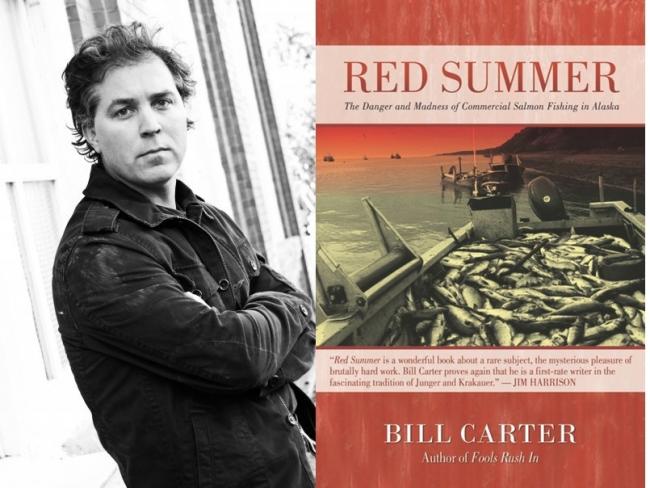Author discusses the danger, madness of commercial fishing
Author Bill Carter will be reading from his book "Red Summer: The Danger and Madness of Commercial Salmon Fishing in Alaska" June 18 at Ray's Boathouse.
Mon, 06/14/2010
Bill Carter’s "Red Summer: The Danger and Madness of Commercial Salmon Fishing in Alaska" chronicles the arduous life of a commercial fisherman. Based on four seasons of experience in Bristol Bay, Alaska, the story documents the intriguing relationships Carter establishes with his surroundings and fellow fishermen.
Carter has also written the memoir "Fools Rush In" and directed the award-winning documentary “Miss Sarajevo.”
Ballard News-Tribune: What is "Red Summer" about?
Bill Carter: It’s about nature; it’s about the battle between fish and man. It’s about these incredible fisheries and this incredible place on earth.
BNT: Having previously written about the Bosnian war, why did you choose to write about commercial fishing?
BC: I didn’t choose to write about it. I finished my first book and someone called me and offered me the job. When you finish a book it means you’re broke. So, I said, “Sure, I’ll do it.”
I had no idea what I was agreeing to when I said that. Sometimes my body was tired, my mind was tired and I wanted to get out of there. But at the same time, I kept going back because there was something about Sharon [the boat captain] and about that place. It was another world.
BNT: What is the lifestyle of a commercial fisherman? What are the risks, demands and joys?
BC: In Bristol Bay, it’s pretty violent. It’s a rough place to fish. Fishermen that come there come from a long ways because you’re so isolated. There’s nowhere to get anything, so you have to be very resilient.
Fishermen [in Alaska] kind of have to be a jack of all trades, like a priest, a dad, a mom, a mechanic, a plumber and a cook. They have to do the whole thing to get their crew to fish.
BNT: What do you think draws people to a rigorous career like fishing?
BC: I think the freedom of being a fisherman really can’t be found anywhere else in any other occupation.
You’re free in that you’ve just done something all day long, very labor-intensive, and then you’re done…when you wake up you’re on the water and in one of the most beautiful places on earth.
BNT: Your book addresses the darker side of commercial fishing as well. What were your experiences?
BC: In Alaska, [fishing season] creates kind of a summer camp vibe.
Because of the volume of fish, because of the hard labor, everyone has a form of pain relief. It’s just reality; you have to find a way to get through the day.
And, it definitely has damaging effects on such a small community. It’s kind of heartbreaking.
But there are plenty of fishermen on the other side—they’re religious, they don’t touch a drop, they’re businessmen so they get in and get out of there.
BNT: Walk me through a day of fishing.
Well when fishing for salmon, your day is ruled by the tides. You’re not on a clock per se; you’re run by the tides.
Fish and Game controls everything, so they get on the radio and make an announcement. They say you can fish at 4 a.m., so you’ll be up at 2:30a.m.
People have tea or coffee, some sort of caffeine. You get your gear on, you get into the boat. If you’re on the water before 4 a.m., it’s illegal, but it’s a heavy day of fishing the rest of the time.
You never want to be caught behind the tides. You live on a six-hour cycle because the tides shift every six hours, so you’re always drawing tidal maps in your head.
BNT: Based on your experience, how will the oil spill in the Gulf of Mexico affect the fishing industries of the region?
BC: It’ll be catastrophic. Cordova still hasn’t recovered 30 years later.
[The Gulf] is a very rich area for fish, and I don’t want to be a doomsayer, but it could be disastrous. It’s like an iceberg, three-quarters of [the oil] is underwater and hasn’t surfaced yet.
But one thing is clear, fish and oil don’t get along. I don’t think that they will necessarily all die. They may just move, but the industry of fishing in that area will take a catastrophic hit.
Bill Carter will be signing and discussing "Red Summer" from 5 p.m. to 8 p.m. on June 18 at Ray's Boathouse, located at 6049 Seaview Ave. N.W. The cost is $50, which includes dinner and a signed copy of the book.


